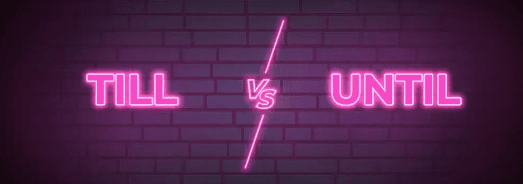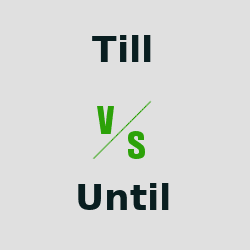Till or Until: Understanding the Differences and Usage
Contents

At Clapingo, we're dedicated to helping non-native English speakers in India improve their fluency. Today, we're diving into the till vs until differences between 'till' and 'until'. These two prepositions are often confused.
Mixing up 'till' and 'until' can cause mistakes in both speaking and writing English. Using them incorrectly can change what you're trying to say and make communication harder.
This article will give you a clear understanding of 'till' vs 'until'. We'll discuss their meanings and how they're used with examples. Let's get started.
What are 'Till' and 'Until'?
'Till' and 'until' are two English words that often confuse non-native speakers. Let's understand the till vs until meanings one by one.
'Till', derived from the Old English word 'til', is a conjunction or preposition, meaning up to the point or time. For instance, "I'll wait at the station till 5 pm."
'Until' is a more formal term with a similar meaning. Originating from Middle English, it also means up to (the point in time). Like, "She'll study until she has mastered the topic."
Both words are used in contexts referring to time but understanding their precise use can be tricky.
Till Vs Until: Are they different?
Despite having similar meanings, 'till' and 'until' aren't always interchangeable. Let's understand this with a simple table:
Till | Until | |
Usage | More casual | More formal |
Examples | "Stay till I come." | "Stay until I come." |
Misunderstandings | Can sometimes be confused with 'till' in cashier/billing context | Rarely causes confusion |
Using 'till' when you mean a cash register (instead of a preposition) may lead to miscommunication. For instance, "He worked at the till until 10 pm." Here the first 'till' refers to a cash register and not a point in time.
To avoid such misunderstandings, it's important to understand the till vs until difference.
Usage of ‘Till’ and ‘Until’ in Everyday Conversations
Using ‘till’ and ‘until’ correctly can make them sound more fluent and natural. Here are some common till vs until examples that show their correct usage:
“Wait here until I return.”
“The shop is open till 9 pm.”
“I can’t leave until the work is done.”
“She will be busy till Friday.”
Now, let's consider a dialogue snippet:
Anuj: "I've got meetings scheduled all day. Can we catch up for tea later?"
Raj: "Sure, I'm free after 6 pm."
Anuj: "Great! Let's meet at the café near our office. I'll be there till 7 pm."
Raj: "Perfect! I'll be there before then. So, until we meet!"
Common Mistakes While Using ‘Till’ and ‘Until’

A common mistake is using 'till' as an abbreviation of 'until'. This is incorrect because both words have different origins. Also 'til' is actually the abbreviation of 'until'.
Another frequent error is using these words interchangeably. While they are synonyms, their usage depends on sentence structure and style. For instance, 'until' typically sounds more formal than 'till'.
Here are some tips to avoid these errors:
Remember that 'till' is not short for 'until'; they are separate words.
Use 'until' in formal conversations or writing.
Use 'till' in casual dialogues or everyday conversations.
Here are some Clapingo blogs on other commonly confusing words in English.
Exercises to Help You Master ‘Till’ and ‘Until’
Here are a few exercises to help you practice ‘till’ and ‘until’:
1. Fill in the blanks:
a) I will wait here ________ you return.
b) Keep stirring the curry ________ it boils.
c) He was working ________ late at night.
2. Correct the errors:
a) I will not go till you don't come back.
b) We can't start until everyone doesn't arrive.
The answers are:
1a - until, 1b - till, 1c - until, 2a - I will not go until you come back, 2b - We can't start until everyone arrives.
Implementing Your Skills in Real-life Scenarios
Understanding the use of 'till' vs 'until' can improve your communication skills. Whether in job interviews, workplace interactions, or even casual social conversations. Imagine confidently explaining your availability to a recruiter. "I'm currently working on my project until October." Or telling a colleague: "The meeting has been extended till 5 p.m."
Improving your English skills not only makes you feel more confident but also helps you grow professionally. To get better at using English correctly, try Clapingo's personalized coaching with native English speakers who can teach you the finer points of grammar. Here's a video to give you a taste of Clapingo sessions.
Quick Recap
Before we wrap up this guide on 'till' vs 'until', let’s quickly revisit the essential points we've discussed so far. Remember, mastering English requires patience, practice, and persistence. We hope with our detailed explanation of till vs until usage, you can now confidently use these words in your daily conversations.
The till vs untill difference is subtle yet significant. Though both refer to a time that is up to a certain point or before a particular moment, 'till' is more informal and less frequently used than ‘until’ in written English.
To reiterate, here are some quick takeaways:
Use 'till' in informal conversations
Opt for 'until' in formal contexts or written English
Practice using both words in different sentences
Finally, remember that consistent practice is key to progress. To make your learning journey easier, you might want to consider Clapingo's personalised one-on-one sessions. These sessions provide ample opportunities to practise and receive feedback on your till vs until usage of phrases like "till" and "until", among other aspects of spoken English.
FAQs
1. What is the main till vs until difference?
The words 'till' and 'until' essentially have the same meaning, signifying up to a particular point in time. However, there can be slight variations based on usage and context. For example, 'till' is often used in informal spoken English, while 'until' is more common in formal written English.
2. Can you provide some till vs until examples?
Certainly! Here's how you can use them in a sentence:
Till: "I can't leave till I finish my work."
Until: "She will stay here until her parents arrive."
3. Is one more grammatically correct than the other – 'till' or 'until'?
Both are grammatically correct and accepted in English language usage. However, the choice between "till" and "until" can depend on the degree of formality or the rhythm of speech required in a particular context.
4. What about ‘til’? How does that fit into the ‘till’ vs ‘until’ debate?
‘Til’ is actually a shortened form of 'until', often used informally or in poetry to maintain rhythm. However, experts suggest it’s best to stick with either till or until to avoid any confusion.
Comments
Your comment has been submitted